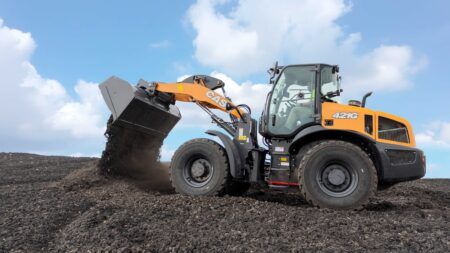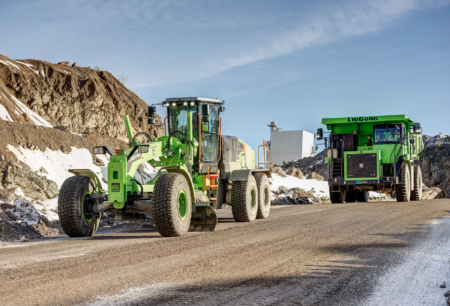Caterpillar has launched its new MH3250 and MH3260 high efficiency material handlers. Replacing the historical Cat 330D MH and 345 C MH models respectively, the Next Generation MH3250 and MH3260 tracked material handlers boast longer maintenance intervals and improved fuel efficiency to decrease owning and operating costs up to 20%. An entirely new cab concept elevates operator comfort throughout the shift to increase productivity.
Both models feature new mechanical variable-gauge undercarriages that flexibly improve machine transportation without sacrificing lifting performance. Track gauge retracts to 3 220-mm (10-ft 7-in) to lower transport costs and make moving the material handlers more efficient. When at the yard, gauge extends to 3 720-mm (12-ft 2-in) wide to increase stability and maximise lift capacities.
The MH3250 and MH3260 deliver impressive capacities when working at their respective 16 010-mm (52-ft 6-in) and 18 000-mm (59-ft 1-in) maximum reach, reducing the number of times the material handler has to be repositioned at the yard to increase productivity.
Raising the performance bar
Three different power modes – Power, Smart and Eco – fine-tune power requirements to the job, so the new MH3250 and MH3260 use less fuel than their predecessors without sacrificing machine performance. Smart Mode automatically matches engine and hydraulic power to working conditions to reduce fuel consumption, while Power Mode provides maximum power to optimise productivity. The machines’ new fuel-efficient engines meet stringent U.S. EPA Tier 4 Final and EU Stage V emission standards and can run up to B20 biodiesel.
These material handlers operate at up to 2 600-mm (8,530-ft) above sea level without derating and offer standard high-ambient temperature capability of 52˚ C (125˚ F) and cold-start capability of -32 C˚ (-25˚ F). New valve priority automatically places hydraulic pressure and flow where it’s required to increase material handling efficiency. Their advanced electrohydraulic system provides the optimum balance of power, efficiency and load control. Auto warm-up reduces the time it takes for hydraulic oil warming in cold temperatures and helps prolong the life of system components.
Work in comfort
Featuring sound suppression for interior noise reduction and rubber cab mounts to reduce vibration feedback, the all-new next generation cab advances operating ease, comfort and productivity. All controls are conveniently positioned in front of and within easy reach of the operator to avoid unnecessary movements. The left-hand console tilts up to offer easy cab entry and exit. Maintaining operator comfort throughout the entire shift in a variety of climates, the premium air-suspension seat is heated and ventilated.
A large, 254-mm (10-in) high-resolution touchscreen monitor with jog-dial offers easy navigation of the intuitive operator controls. Using the new Operator ID function, different machine operators can store their specific joystick and preferred power mode settings, and the machine automatically recalls the settings based on the ID. Improving highwall trailer loading/unloading and shredder loading efficiency, the hydraulically controlled cab rises to a maximum elevation of 6 020-mm (19-ft 9-in).
Safety in mind
Smaller cab pillars, combined with large tempered windows and a flat engine hood, deliver excellent all-around visibility for the operator, increasing safety. With video feed displayed on the large touchscreen monitor, standard rearview and sideview cameras improve work area visibility. The cab design includes thick, impact-resistant safety laminated windshields that meet P5A standards, while operators are protected from falling and flying debris by the standard Falling Object Guard System (FOGS).
An upper-level service platform with access steps constructed of antiskid punch plate provides easy, safe and quick access to machine service items. In the event of a hydraulic service interruption, the cab can be safely lowered via one of two emergency cab lowering valves, located inside the cab as well as outside of the machine. Check valves on the boom and stick prevent reverse hydraulic oil flow, to maintain the position of the front linkage should the hydraulic system experience an unexpected loss in pressure.





